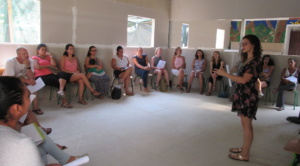Partners in learning? What does that mean anyway? I am now in my 4th school year as part of the Futuro Verde community; as a teacher, a coordinator, and also a parent. What do I love about Futuro Verde? I love the diversity that we have…nationalities, ethnicities, languages, cultures, socioeconomic levels, religions…in just one small school community. We join together with one major goal – we want a better future for our students, children, and our entire families. While we might have very different ideas and opinions on how to reach this goal, I see one uniting factor to achieve our purpose, which is much more evident during this worldwide pandemic, to become partners in learning.
Most societies and communities support the age-old saying “it takes a village to raise a child” but many just aren’t quite able to live and breathe this statement. Right now, we have the chance to pay attention to the small things, as parents, as educators, as community members, to spend time with our children, to support in their education, not just the academic side, but the development of life long skills that will help our children be happy, balanced and successful in their own ways. This idea actually has a term, “partners in learning”.
At Futuro Verde, our vision and mission statements both support the idea of life long learning and the development of a network of partners in learning. We strive for our students to become life long learners, as well as our staff. During the current crisis, we have taken the time to participate in online courses, webinars, and continual research on how to improve education in the current circumstances. We also want to extend this offer to our parents. Massiel, our school psychologist, has been offering parent webinars to involve parents as active members in their child’s education, focusing on holistic practices in education and parenting.
Some examples of past and future webinars for parents include:
- Emotions 911: Understanding and empathy
- Family hours and rules: Positive reinforcements
- Yes, the ideal family can be achieved: Family communication
- Affection in the family: acknowledging emotions: Attachment Theory and Communication
- Practice makes perfect: discipline and consequences: Constancy with the rules of family coexistence
- Two or more children at home: keeping the boat afloat: Sibling relationships
- School motivation and performance: Intrinsic motivation and extrinsic motivation
Please be on the lookout for more upcoming webinar offerings by email and our website. We look forward to your participation as we strengthen the support system to our students, our families, and our community. Every piece of the puzzle is just as important as the big picture.
“Children are the priority. Change is the reality. Collaboration is the strategy.”
-Justin Billings (Washington State Superintendent)


